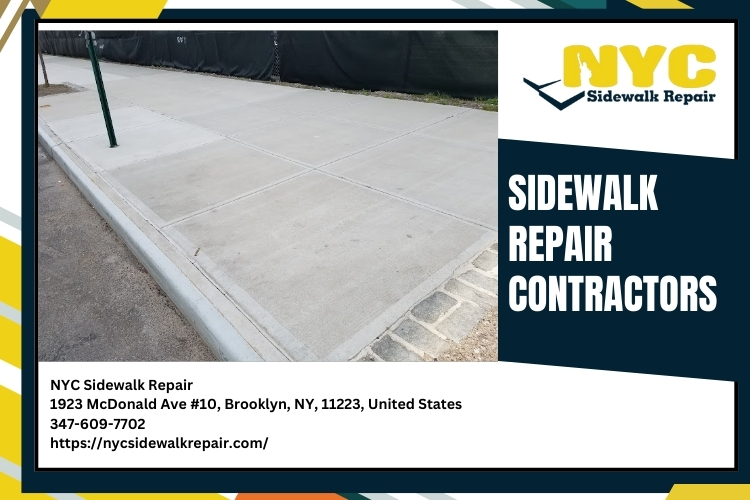" width="560" height="315" frameborder="0" allowfullscreen>
Introduction
Concrete sidewalks are a staple of urban infrastructure, providing safe passage for pedestrians and enhancing the overall aesthetics of neighborhoods. However, over time, these sidewalks can suffer from damage caused by weather conditions, heavy foot traffic, and other environmental factors. In Manhattan, where concrete sidewalks are ubiquitous, understanding how to repair them is vital for property owners and city officials alike. This comprehensive guide will delve deep into the nuances of sidewalk concrete repair in Manhattan while also touching on related topics like sidewalk concrete repair Staten Island, sidewalk and driveway repair Brooklyn, sidewalk and driveway repair Queens, and sidewalk and driveway repair Bronx.
Table of Contents
Understanding Sidewalk Concrete Damage- 1.1 Types of Damage 1.2 Causes of Damage 1.3 Importance of Timely Repairs
- 2.1 Visual Inspection Techniques 2.2 When to Call a Professional
- 3.1 Pros and Cons of DIY Repairs 3.2 When to Hire a Contractor
- 4.1 Essential Tools 4.2 Types of Concrete Mixes
- 5.1 Preparing the Area 5.2 Filling Cracks and Holes 5.3 Resurfacing Techniques
- 6.1 Permits Required for Repairs 6.2 City Codes and Compliance
- 7.1 Average Costs in Manhattan 7.2 Cost Breakdown by Type of Repair
- 8.1 Routine Maintenance Tips 8.2 Seasonal Care Recommendations
Conclusion
FAQs
Understanding Sidewalk Concrete Damage
Types of Damage
When discussing sidewalk concrete damage, it's essential to recognize that not all cracks or defects are created equal.
- Hairline Cracks: These tiny fissures often appear due to temperature fluctuations but usually do not compromise structural integrity. Spalling: This occurs when the surface layer flakes off due to moisture infiltration and freeze-thaw cycles. Heaving: Soil movement can cause sections of the sidewalk to rise unevenly.
Causes of Damage
The primary Queens concrete sidewalk services causes of concrete damage include:
- Weather Conditions: Rain, snow, ice, and sun exposure can all contribute to deterioration. Heavy Foot Traffic: Urban environments see an abundance of foot traffic that can wear down surfaces over time. Poor Installation: If sidewalks were not installed correctly initially, they might be prone to early damage.
Importance of Timely Repairs
Ignoring minor issues can lead to significant problems down the road—both financially and in terms of safety risks for pedestrians.
Assessing the Condition of Your Sidewalk
Visual Inspection Techniques
Conducting a thorough inspection is crucial before proceeding with any repairs:
- Look for cracks larger than a quarter-inch wide. Identify areas with standing water or pooling after rain.
When to Call a Professional
If you're unsure about your assessment or the extent of damage appears significant (like large cracks or heaving), it’s best to consult professionals experienced in sidewalk concrete repair in Manhattan.
DIY vs Professional Repairs
Pros and Cons of DIY Repairs
Taking on your sidewalk repair project can save you money but comes with its own set of challenges:
Pros:
- Cost-effective. Sense of accomplishment.
Cons:
- Requires time and physical effort. Risky if you lack experience.
When to Hire a Contractor
If your project involves extensive damage or requires specialized equipment (like concrete saws), hiring experts is advisable.
Types of Concrete Mixes
Select the appropriate mix based on your needs:
- Ready-Mix Concrete: Ideal for larger projects requiring uniformity. Patch Compound: Best suited for smaller crack repairs.
Step-by-Step Guide to DIY Sidewalk Concrete Repair
Preparing the Area
Start by cleaning up debris around the damaged area using a broom or pressure washer.
Filling Cracks and Holes
For concrete sidewalk repair bronx small cracks:
Clean out loose debris. Apply patch compound following manufacturer instructions.For larger holes:
Cut out damaged areas first using a chisel. Fill with ready-mix concrete ensuring proper leveling.Resurfacing Techniques
To give old sidewalks a fresh look:
Mix resurfacer according to instructions. Spread evenly over existing surface using a trowel.Understanding Local Regulations in Manhattan
Permits Required for Repairs
Before initiating any significant repairs, check with local authorities regarding necessary permits.
City Codes and Compliance
Familiarize yourself with city codes pertaining to sidewalk specifications—this ensures compliance while protecting you from future liabilities.
Cost Breakdown by Type of Repair
Understanding specific costs associated with different types helps budget more effectively:
- Small repairs generally cost less than large-scale restorations. Expect higher prices during peak seasons when contractors are busy.
Preventative Measures for Longer-Lasting Sidewalks

Routine Maintenance Tips
Regular inspections should become part of your routine—look out for new cracks or signs indicating wear-and-tear before they escalate into costly repairs!
Seasonal Care Recommendations
In winter months particularly:
- Clear snow promptly post-storms as ice accumulation can exacerbate existing cracks.
In summer months:
- Reseal surfaces every few years if applicable for longevity!
Conclusion
Sidewalk concrete repair is an essential aspect that cannot be neglected—especially within bustling cities like Manhattan where pedestrian traffic is high! Whether you're performing minor fixes yourself or seeking professional assistance through services such as sidewalk concrete repair Staten Island or driveway repair across other boroughs like Brooklyn, Queens & Bronx; being proactive about maintenance will ultimately save you both hassle & costs down-the-line! By understanding various types & causes behind damages alongside legal requirements; you'll approach any project armed with knowledge ready-to-tackle whatever comes next!
Contact Us
NYC Sidewalk Repair
1923 McDonald Ave #10, Brooklyn, NY, 11223, United States
Phone: 347-609-7702